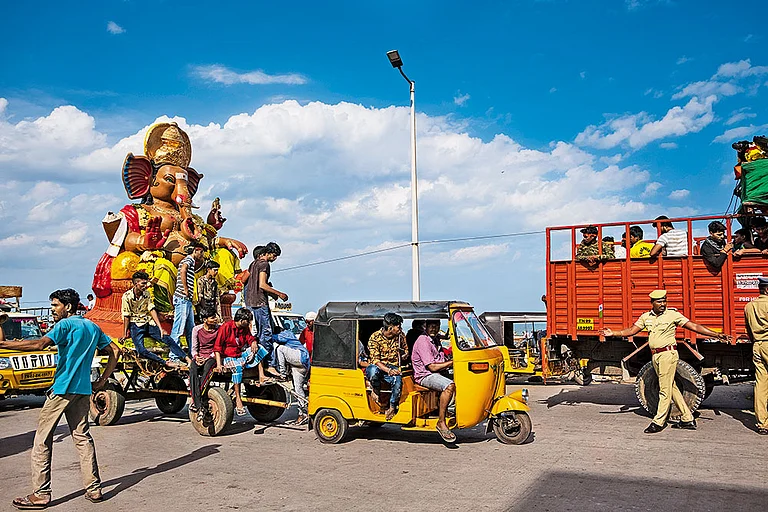“They accuse us of being anti-Hindu. Are we not Hindus? My name is Siddarama. My name too has Bhagwan Ram’s name. We are the devotees of Lord Rama and Hanuman. … The real Hindu is one who loves all religions. You judge who the real Hindus are. Us or BJP leaders?” Congress leader and Karnataka Chief Minister Siddaramaiah – who had always publicly described himself as the original face of ‘Ahinda’ – had said in 2017 while addressing a public function. The public allegiance to Hinduism by him and other party leaders led many to claim that the Congress was peddling ‘soft Hindutva’ as an electoral strategy.
How Soft Hindutva Politics Has Been Playing Out In South India
The public allegiance to Hinduism by Siddaramaiah and other Congress leaders has led many to claim that the party was peddling ‘soft Hindutva’ as an electoral strategy.

Almost seven years later, Siddaramaiah chanted ‘Jai Shri Ram’ after inaugurating a Ram Sita Lakshman temple and a 33-ft monolithic Hanuman idol at Mahadevapura in Bengaluru on January 22, leading some commentators to again label it as a tactic of Hindu appeasement. One similarity between the two instances is that the grand old party has been looking to improve its vote share in general elections – BJP employed aggressive Hindutva tactics during the 2019 elections when it won 25 seats out of 28 in Karnataka. Although the grand old party defeated the Basavaraj Bommai-led BJP government in the state in 2023, analysts say the party will still have to tread carefully when it comes to temple politics and its commitment to ‘Hindu causes’.
Congress in the South
While the Congress party refused to attend the grand consecration ceremony of the Ram Mandir in Ayodhya on January 22, claiming that it was a "political project" of the BJP, Ramalinga Reddy, a senior minister in the Karnataka Congress cabinet whose department administers the state’s shrines, issued an order mandating all temples to perform pujas on that day. The decision was welcomed by many state BJP leaders.
The order came days after the arrest of Hindutva activist Srikanth Poojari in a three-decade-old case pertaining to riots that happened during the Shri Ram Janmabhoomi protests in 1992, which triggered massive backlash from the BJP which then accused CM Siddaramaiah of doing "vendetta politics" ahead of January 22 event. However, when the day of the consecration ceremony arrived, Siddaramaiah visited a Ram Sita Lakshman temple in his village and chanted the ‘Jai Shri Ram’ slogan – a chant that has become the rallying cry of aggressive Hindutva action.
In an opinion piece in the Telegraph early this year, historian Ramachandra Guha wrote that these were attempts made by Siddaramaiah “to flaunt his own Hindu devotionalism. These attempts by the Karnataka Congress to mimic the methods of Hindutva are morally dubious.”
Around the same time, several media reports also revealed that the state Congress government sought funds to renovate 100 Ram temples across the state in a bid to counter the saffron party’s criticism of the party not attending the consecration ceremony.
Recalling the party's 'soft Hindutva' roots, Shivasundar, senior journalist and activist in Karnataka, told Outlook that although the Congress-led government won a huge mandate during the 1990s when the Ramjanmabhoomi movement was at its peak, the grand old party “did not have a vision” and couldn’t politically “confront the idea of Hindutva and Hindu Rashtra.” “The Congress also raised funds for construction of a grand Ram temple in 2020 under the leadership of Priyanka Gandhi,” Shivasundar recalled, in a public statement. The same ideological stance seems to be continuing even now, he said, pointing out the example of Congress leader Kamal Nath and his politics in Madhya Pradesh.
Other than Congress
While the BJP and its Hindutva practices have limited resonance in South India, it is seeking to make an entry into the political arena of the region through alliances with regional parties like Telugu Desam Party (TDP). For the upcoming Lok Sabha elections, BJP, TDP and Pawan Kalyan’s Jana Sena will be contesting together.
The TDP chief has claimed on multiple occasions that he was a ‘secular’ leader, often citing the instance of snapping ties with the BJP in the aftermath of the Gujarat riots that took place during the tenure of then chief minister Narendra Modi in 2002, to validate his claim. However, the party has made several flip-flops on its ideological stance, and has now walked back into the NDA for the upcoming elections.
Naidu has been infamous for his ‘Christian CM’ comment against Andhra CM Jagan Mohan Reddy in 2021. “The CM might be a Christian and might have intentions to convert Hindus. But to willfully resort to wrongdoings, with intention of conversions while in the CM position is inappropriate, amounting to betrayal,” Naidu had said while terming Reddy as "Hindu drohi.” His remarks came in the backdrop of alleged attacks on temples in the state.
In the alliance’s first joint public meeting in a decade, Pawan Kalyan of Jana Sena and PM Modi invoked Lord Ram, Krishna and icons from Mahabharata as well. Pawan Kalyan compared himself to Arjuna from the Mahabharata and said it is for “Sri Krishna of Dwarka to blow the panchajanyam (conch).” “Modi who comes from Gujarat’s Dwarka would blow the conch for this election Kurukshetra (poll war) for the victory of dharma, justice and the alliance,” the actor-politician said.
Meanwhile, PM Modi accused the YSRCP of insulting Telugu icons NT Rama Rao and PV Narasimha Rao. “NTR garu, who personified the roles of Lord Ram and Krishna on screen, and who (as TDP founder president and Andhra Pradesh chief minister) strived for the poor, was troubled, disrespected by the Congress. We have released a coin in commemoration of NTR’s birth centenary,” he said.
- Previous Story
 Marital Rape 'A Social Issue Not Legal', Centre Files Affidavit With SC Against Criminalisation
Marital Rape 'A Social Issue Not Legal', Centre Files Affidavit With SC Against Criminalisation - Next Story




























